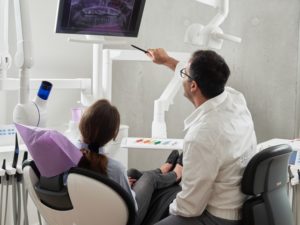02 May The Ultimate Guide to Understanding Oral Appliance Therapy
 Maybe you have heard about oral appliance therapy. Maybe you have just been diagnosed with sleep apnea. Maybe your sleep partner is tired of hearing you snore all night. Regardless of the reason, you are here to learn more about oral appliance therapy and whether it may or may not be right for you.
Maybe you have heard about oral appliance therapy. Maybe you have just been diagnosed with sleep apnea. Maybe your sleep partner is tired of hearing you snore all night. Regardless of the reason, you are here to learn more about oral appliance therapy and whether it may or may not be right for you.
Who can use oral appliance therapy?
Oral appliance therapy, or OAT as some call it, is a treatment for people who suffer from snoring or sleep apnea. Most people snore, at least some of the time. While you sleep, your face, and more importantly, your mouth and throat, relax. Your soft palate or tongue can cover the top of your windpipe.
When you exhale, your breath flutters the tissue, making a fluttering or snorting sound. You know the feeling if you have ever had a head cold or allergies. It can irritate your sleep partner and can even be so loud that you wake. But if snoring goes from an occasional issue to a full-time problem, you might benefit from OAT.
Snoring is more than just an inconvenience. In some people, it becomes more serious. In some cases, the blockage is strong enough that the sleeper can’t breathe. It may be for only a few seconds, or it can be for much longer. When you stop breathing, the condition is called Sleep Apnea. It has much more severe side effects and can lead to sleep disorders as well as heart and blood pressure issues.
What is oral appliance therapy?
An oral appliance is exactly what it sounds like: a small device that goes in your mouth. It uses engineering to stop your tissue from blocking your airway. In general, there are two types of oral appliances.
Mandibular repositioning appliances pull your lower jaw slightly forward and down. The mandibular appliance keeps your airway open and prevents both the fluttering sound and the risk of sleep apnea. It’s the most common form of oral appliance.
Another, less common appliance holds your tongue in the bottom of your mouth and prevents it from falling backward and blocking your throat.
What are the benefits of oral appliance therapy?
The earlier you can start treatment for your snoring, the less damage it will do. Oral appliance therapy isn’t the only therapy available for snoring. However, OAT is tiny, portable, and easy to use compared to a CPAP machine.
You don’t have to clean a dozen moving parts every day or travel with an extra suitcase for your machine. Instead, your appliance fits easily in a purse, briefcase, or gym bag.
Oral appliance therapy is also drug-free. So, you don’t have any lingering drug hangover when you want to get up in the morning. It’s also non-invasive, so no surgery is needed to install the device or remove it if you decide it isn’t for you.
What are the drawbacks?
Like anything, it may take you some time to get used to keeping the device in your mouth while you sleep. Because it changes how you hold your jaw while sleeping, you may wake with a sore jaw or even develop TMJ.
It might also change your bite or even the position of your teeth over time. In addition, the appliance will hold your mouth in a specific position. So, you may find yourself drooling more than before.
How do I know if oral appliance therapy is right for me?
The first step of exploring if oral appliance therapy is right for you is to see your doctor. The doctor will take your medical history. Together, the two of you will go over your current symptoms.
If you and your doctor decide that your sleep issues will respond to the oral appliance therapy, you will take the next step. You may need a sleep study to determine if your snoring is sleep apnea.
How long will it take to start using my oral appliance?
Your doctor will need several days to several weeks to build your custom device. First, your doctor will X-ray your jaw and make an impression of your teeth.
Then he will design and build your appliance. When finished, you will try the appliance on, and before long, you will be sleeping easier.
Final Thoughts
Oral appliance therapy is a great alternative to a CPAP machine if it’s right for you. When you are interested in looking into oral appliance therapy, contact us at Crosspointe Sleep Solutions. We’re happy to help!
